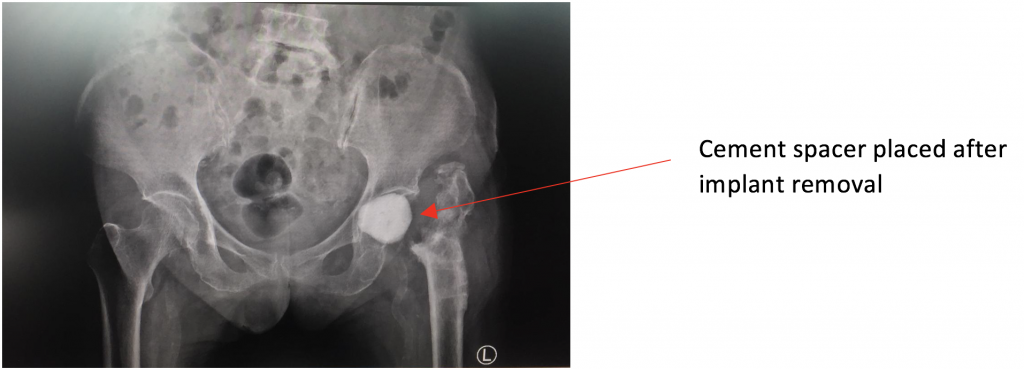Hip fracture nonunion due to chronic infection
This 94 year old lady presented with worsening hip pain. Her symptoms were all aggravated over a 1 week history. She had previous fracture fixation done three years ago in a different hospital. Initial recovery was suboptimal with pull out of screws as can be seen from the last X-ray. She was coping with limited ambulation and decision was made in view of her age for non-operative management thereafter. She has a history of diabetes and osteoporosis.
Two months prior, she was having history of urine infection which was treated with admission. In the last 1 week prior to presenting to the orthopedic surgeon, she had worsened hip pain and inability to walk. There was no history of trauma. Radiographs revealed progressive implant loosening. It was rather unusual that the implant loosening was more dramatic in the last 1 year in comparison to the previous X-rays. Moreover, pre-operative blood test revealed increased CRP. Increased CRP is a suggestion of ongoing inflammation or severe infection. In view of the unusual findings, it was recommended that she would need a revision arthroplasty. But this will be subjected to rapid infection test.

Technology allows us to do rapid infection test with almost 90% accuracy. We used a product called Synovasure which allows us to test for rapid infection. The test turned out to be positive shown in the attached photograph. In view of this, the replacement hip surgery could not proceed. However, she had removal of all the implants and the cement spacer was applied. Following the surgery, there was immediate pain relief and recovery of the patient. She was started on ambulatory physiotherapy.


She was discharged after a 5 days inpatient stay. She completed her physiotherapy and is currently on antibiotics to treat the infection. It is important when you have infection in fracture that bone union may be impeded. Therefore, it is very crucial to treat the infection before any further revision surgery is done. After she recovers from this hip surgery, she may require revision replacement depending on her physiological status after it is optimised by her internal medicine physician.
Share this blog via:





